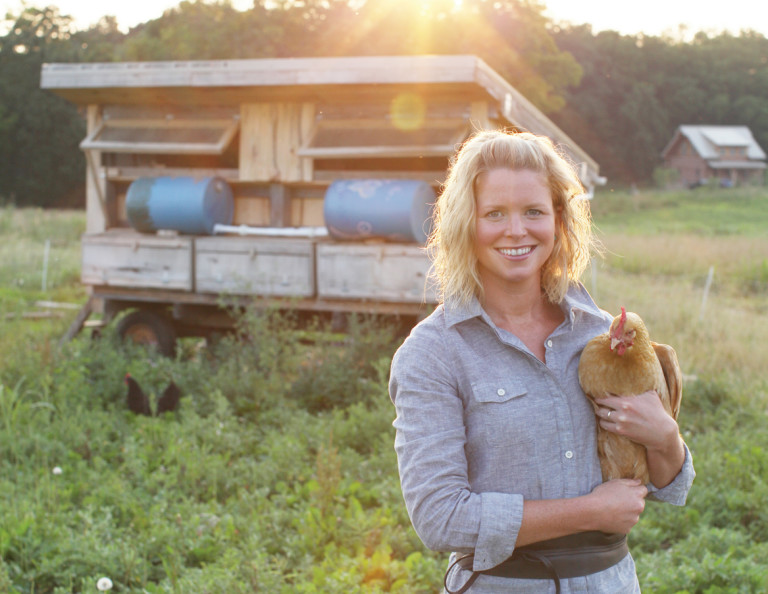Connections are important to Maggie Barrett Keith ’03. First is her connection to the 1,300 acres of Foxhollow Farm, which has been in her family since the 1930s. As co-owner and manager of Foxhollow, an organic farm in Crestwood, Maggie is always aware of the farmer’s connection to the land. She also loves the way that farming connects her with other people through her food: “One of the most satisfying things about farming is handing families food they can eat,” she says.
Maggie’s road to Foxhollow started at Appalachian State University, where she was studying entrepreneurship. It was there that she read The Omnivore’s Dilemma, Michael Pollan’s study of organic and industrial farming methods. “[That book] totally changed how I ate,” Maggie recalls. “It made me think about where my food was coming from — who was growing it and how it was being grown.” Those thoughts evolved during Maggie’s senior year into a business plan for a grass-fed beef farm. That plan became a reality in 2006 with the introduction of thirty head of cattle to Foxhollow land.
Maggie remembers those early years as challenging ones. “When I first started selling at farmer’s markets in 2007, I was one of the only young women selling meat, and there just wasn’t that much meat at the market. I had one gentleman tell me that I’d never be able to make it, that I’d have tons of beef sitting in my freezer for the rest of my life. It was kind of good for me in a way, because whenever someone tells me I can’t do something, I just want to do it more.”
Maggie began taking her product to local chefs and letting them sample it. “The product spoke for itself, so in that sense it was easy,” she recalls. “A lot of the older people said it reminded them of how beef used to taste when they were growing up.”
The most challenging thing when you’re starting a business is to take it slow. Sometimes that’s hard for me, but you’ve got to master the things you’re already doing before you add something new. I’ve always made sure that I’m hands on with anything I do here.
As Maggie worked to get her business established, food culture was slowly changing around her. Bit by bit, markets were opening up for Foxhollow’s organic, sustainably raised product. “Farm to table is a big thing now, and it’s become easier to go to farmer’s markets and sell.” Maggie reflects. “There are way more markets now than there were back then — not only farmer’s markets, but restaurants and schools.”
Foxhollow is a biodynamic farm, a method that is “similar to organic but goes a few steps further,” Maggie explains. “Instead of bringing in organic pesticides and herbicides, we make our own out of things that come from the land, like manure, chamomile, yarrow, stinging nettle — things we actually grow.”
Maggie believes that there are now a lot of people looking for alternatives to industrially farmed food. Foxhollow’s methods, she says, are better for the animal, better for the land, and better for the customer. “When you rotate cattle properly, you keep both the cattle and the land healthy,” she explains. “Our cows are eating grass, which is what they’re meant to eat. They’re happier when they’re living the way that nature intended them to live. The benefit to the customer is that the meat’s better for you: lower in saturated fat, higher in antioxidants and vitamins.”
Maggie’s hard work in those early years is paying off. There are now 200 head of cattle grazing on Foxhollow land, and the number of employees has grown from two to nineteen. Several years ago, Maggie realized her longtime dream of growing produce at the farm. With the cattle operation in good hands, she’s been able to turn her attention to the garden. “My dream was always to be in the garden,” she admits. “I’ve always loved to play in the dirt, ever since I was little.” In 2009, Foxhollow opened its Farm Store, which finally provided a place for Maggie to sell Foxhollow’s meat, produce, and more.
Looking back, Maggie says she is sometimes surprised at the ways that KCD helped prepare her. “I loved Dr. Campbell’s creative writing class,” she says. “Being able to write well and to put some creativity into it was one of the big things I took away from KCD. It was one of the real advantages I had in business school.” Maggie also says that Chris Brice’s philanthropy class has had a lasting impact. “I volunteer a lot in my life because of that class,” she says. “It taught me the importance of volunteer work and how to be an active board member. We hold two big festivals each year at the farm, and I use those as fundraisers to give back to local organizations.”
Being a small business owner has not always been easy, and Maggie says her biggest challenge has been learning to take her time. “The most challenging thing when you’re starting a business is to take it slow. Sometimes that’s hard for me, but you’ve got to master the things you’re already doing before you add something new. I’ve always made sure that I’m hands on with anything I do here.”
Looking forward, Maggie imagines orchards, vineyards, maybe even wine. In the meantime, though, she continues to relish the connections that farming creates. “There’s a connection between the land and the animal or the vegetable,” she explains, “a connection between the farmer who grows the food and the people who eat it. At the farmer’s market, there are customers that come to my booth every week, and they want the vegetables I grow or the beef I raise. That’s the most rewarding thing to me, especially with families. I like to see kids eat our food.”

